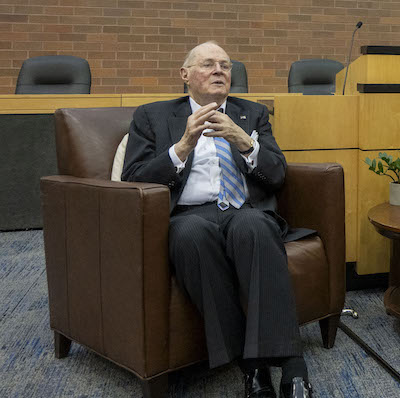Top Story
Oct. 28, 2025
Justice Kennedy recalls McGeorge roots, landmark rulings in Sacramento talk
Retired U.S. Supreme Court Justice Anthony Kennedy reflected on his Sacramento roots, his landmark rulings, and encounters with figures from Vladimir Putin to the plaintiff in Chadha during a McGeorge School of Law talk.





SACRAMENTO -- Retired U.S. Supreme Court Justice Anthony Kennedy spoke at McGeorge School of Law on Monday night about his new memoir, "Life, Law & Liberty." The Sacramento native reminisced about meeting Vladimir Putin, being pressured by "three lions of the bar" to teach constitutional law at McGeorge, and an unexpected meeting with the plaintiff in one of his most famous opinions.
McGeorge Dean Michael T. Colatrella Jr. detailed Kennedy's long association with the city and its flagship law school. Kennedy attended McClatchy High School -- also the alma mater of former Chief Justice Tani G. Cantil-Sakauye and Attorney General Xavier Becerra -- raised his children in Sacramento and taught constitutional law for decades at McGeorge.
But the last item on that list was not originally his choice. In 1965, shortly after Kennedy moved back to Sacramento with his family to take over his father's law practice, he met with U.S. District Judge Sherrill Halbert, Sacramento County Superior Court Judge Robert W. Cole, and McGeorge Dean Gordon Schaber. At first, he told them, he could consider teaching "in a couple of years" when his life calmed down.
"They said, 'No, we need you to teach beginning next semester,'" Kennedy told the full auditorium at the campus near downtown Sacramento. "And I said, 'No, I can't do that.' Then, as I say in the book, the three lions of the bar circled closer. Finally, I said, 'Well, when I do teach, I think I have to teach contracts or estate planning.' And they said, 'No, constitutional law.'"
Of course, Kennedy would go on to change constitutional law. On the recommendation of outgoing California Gov. Ronald Reagan, President Gerald Ford named him to the 9th U.S. Circuit Court of Appeals in 1975.
Five years later, he wrote the majority opinion in Immigration and Naturalization Service v. Chadha, 634 F.2d 408 (9th Cir. 1980). Kennedy found that a provision in the Immigration and Nationality Act that allowed Congress to override the attorney general's decision to suspend a person's deportation was unconstitutional. Three years later, the U.S. Supreme Court upheld that decision. This allowed the Kenyan-born man of Indian descent, who had overstayed his student visa, to stay in the country and eventually become a citizen.
"Maybe a year later I was in the Tower Bookstore in San Francisco on Van Ness Avenue buying some CDs," Kennedy told the crowd. "I gave my credit card and [the clerk] said, 'Are you the Anthony Kennedy?' And I said, 'Well, yes.' He said, 'I'm Chadha, the guy you let stay.'"
Reagan nominated Kennedy to the U.S. Supreme Court in 1987, where he served 30 years. Kennedy wrote some of the court's most famous decisions. One of the earliest was Texas v. Johnson, 491 U.S. 397 (1989), upholding a protester's right to burn an American flag under the First Amendment. Kennedy told the crowd that he was motivated in part by the idea that if Texas could ban flag burning, it could outlaw many other types of constitutionally protected speech.
But none was more famous than Obergefell v. Hodges, 576 U.S. 644 (2015), Kennedy's opinion legalizing same-sex marriage across the country. Colatrella read portions of that opinion from Kennedy's book.
Kennedy said that as an older person, the idea of same-sex marriage was initially difficult for him to understand. But as he learned more about the plaintiffs and others seeking this right, he began to appreciate their constitutional argument.
"It would misunderstand these men and women to say they disrespect the idea of marriage," he said. "Their plea is that they do respect it, respect it so deeply that they seek to find its fulfillment for themselves."
Kennedy also spoke about his world travels. This included trips to learn about criminal justice systems in Europe, where many countries have shorter sentences and a greater focus on rehabilitation.
One of these trips also led to a meeting with Putin, who had not yet become president of Russia. Their discussion covered topics ranging from judicial independence to the death penalty. That is when the conversation took a dark turn.
"He leaned across the table and said, 'I have been across the table from murderers, closer to them than I am to you, and I could strangle them with my own hands,'" Kennedy recalled. "And I thought the interpreter hesitated on 'could' or 'did.'"
For reprint rights or to order a copy of your photo:
Email
Jeremy_Ellis@dailyjournal.com
for prices.
Direct dial: 213-229-5424
Send a letter to the editor:
Email: letters@dailyjournal.com


